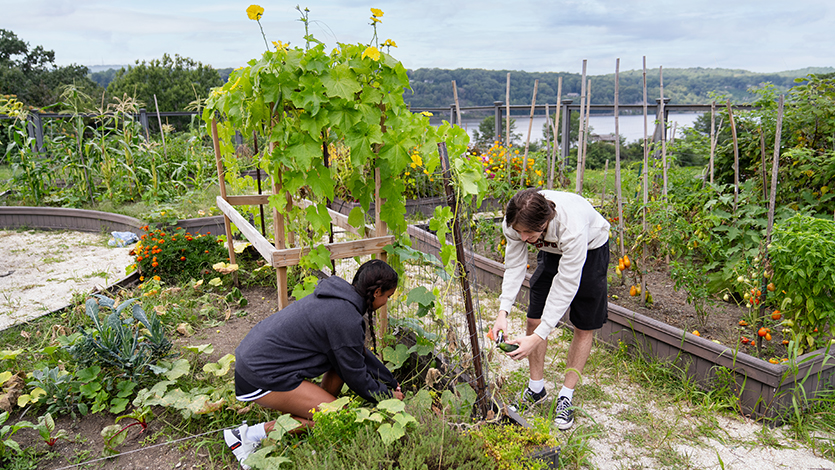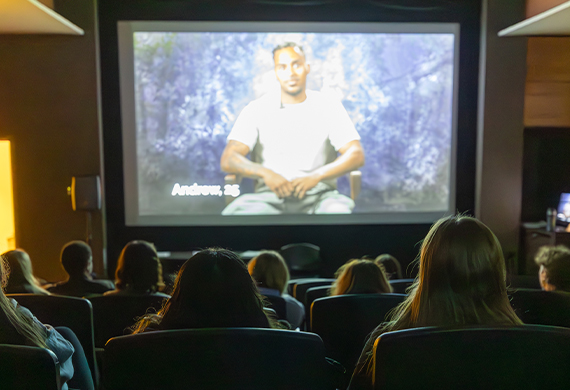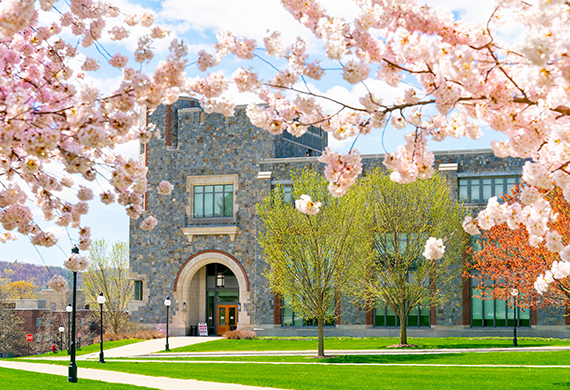Harvesting Hope & Nourishment in the Marist Community Garden

September 18, 2023 — The Marist Community Garden is more than just a place to grow fruits, vegetables, and flowers; it's a symbol of the College's commitment to sustainability, expansive community, and the power of hands-on learning.
During the academic year, much of the garden serves as a source of fresh food and flowers for campus and beyond, as it brims with life, educational experiences, and opportunities for collaboration. The garden has 13 active plant beds that are all tended to by student volunteers from the Ethics of Food Class, clubs like Students Encouraging Environmental Dedication (SEED), and faculty in the fashion program who use the marigolds and flowers for sustainable fashion dyes for classes and student designers.
Once considered a hidden gem tucked behind the dining hall, the garden has blossomed since its beginning in 2017. Overlooking the Hudson River, you will find colorful flowers as well as an array of seasonal vegetables and herbs like basil, kale, chard, tomatoes, peppers, radishes, pumpkins, and more.
The garden all started when alumna Alexa Kovlakas '16 came up with the idea for an on-campus garden for her honors project after taking Dr. Joseph Campisi’s Ethics of Food Class. The seeds of Alexa’s ideas began to sprout when student Alec Lee '18 carried on her work with Dr. James Snyder. Alexa's original ideas and Alec’s extensive plans and blueprints for the garden were presented as a full proposal to the College in 2017.
Image of Alec Lee's '18 blueprints for the Community Garden.
In the students' proposal, they highlighted how community gardens have been shown to promote healthier lifestyles, build stronger communities, relieve stress, increase overall well-being, and serve as a way for students to engage with the campus, the natural environment, and the local Poughkeepsie community.
The students’ proposal was approved and the College broke ground in 2017. Over the years students have continued to pass the baton to their fellow classmates, sustaining the continued care, growth, and impact of the garden. Alexa went on to become a physician assistant, while Alec, a Barry Goldwater Award winner, now works in biotechnology.
Today, studio art major and environmental science minor Bella Wild '24 oversees the garden alongside Dr. Campisi, the garden's informal supervisor whom Bella has known since her first year at Marist. Bella’s role as the Community Garden Intern was coordinated through AmeriCorps over the summer and now through the Center for Civic Engagement & Leadership for the academic year.
“I love bringing in what I learn in class into the garden and hope to create a space for other students to do the same,” Bella said. “In the spring I took an Indigenous Knowledge class as a special topics course and learned so much from the assigned readings, including Braiding Sweetgrass. I decided to start a bed in the garden over the summer with the three sisters, after learning so much about traditional ecological knowledge, and its importance in the face of climate change; when these plants grow and work together, they all contribute more nutrients and benefits more than they would individually.”
Braiding Sweetgrass is this year’s First Year Seminar Program Common Read. Braiding Sweetgrass author Robin Wall Kimmerer will be speaking at Marist on October 4th.
Bella Wild in the Marist Community Garden (photo by Nelson Echeverria).
As the Community Garden Intern, Bella spent the spring planting seedlings in the Donnelly Greenhouse and the sunny Henry Hudson Room in Fontaine before planting some of them in the garden. Over the summer, she tended to the garden watering, pruning, and harvesting. As plants grew, Bella collected 140 pounds of fresh food and herbs during the 2023 growing season, which were donated to Dutchess Outreach, a nonprofit that helps broaden food security, access, and equity in the local community.
According to Dr. Campisi and Bella, there are even more plans for community collaboration in the garden that are underway.
“I love teaching and learning from the students in the garden,” said Dr. Campisi. “I get to teach students who have never gardened before how to grow plants like tomatoes, but I also get to learn and work with more advanced gardeners like Bella. It’s very powerful to be able to see all of our work of planting seeds in the spring grow into beautiful produce come fall.”



